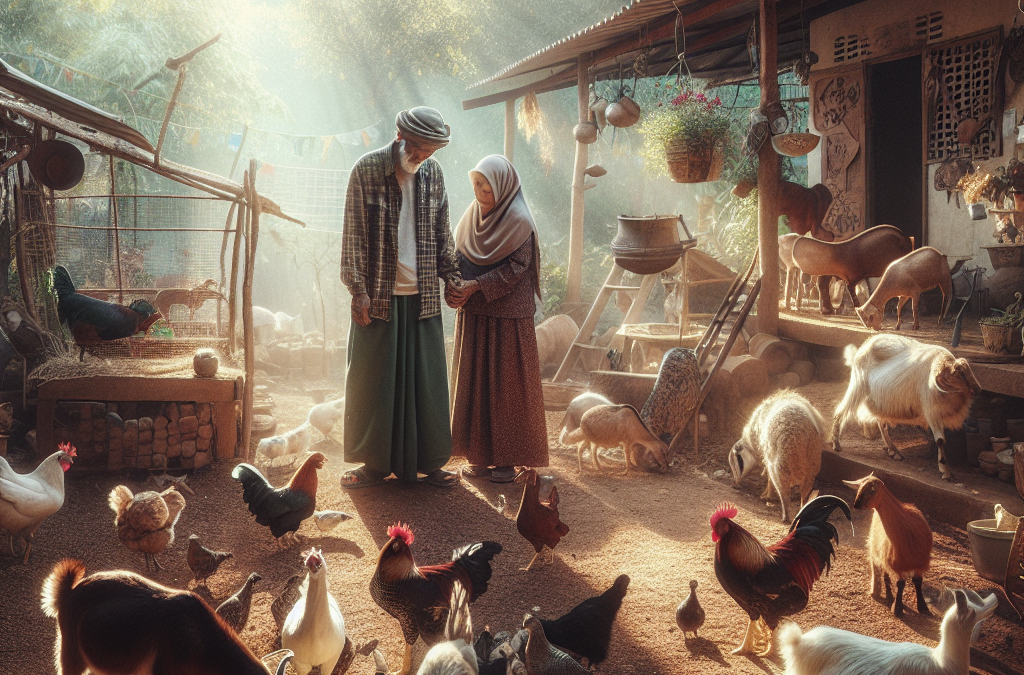If you’re looking to start your own small homestead or just want to have fresh eggs and milk at home, raising livestock can be an excellent choice. However, caring for chickens, goats, and other animals requires time, effort, and knowledge. In this blog post, we will cover everything you need to know about raising livestock in the backyard, including how to care for chickens, goat housing and feeding requirements, and information on other animals you can raise at home.
Introduction to Raising Livestock in the Backyard
Raising livestock in the backyard is becoming increasingly popular as more people seek sustainable living options. By raising your own chickens, goats, and other animals, you can enjoy fresh produce and dairy products while also reducing your carbon footprint. Additionally, raising livestock can provide a sense of self-sufficiency and connection with nature that many find rewarding.
However, before diving into raising livestock, it’s essential to do your research and plan carefully. Depending on where you live, there may be laws regulating the types of animals you can keep and how many you can have. You should also consider the space available, the cost of supplies and food, and your level of experience with animal husbandry.
How to Care for Chickens on a Small Homestead
Chickens are one of the most common animals raised in backyards, and they require minimal space and upkeep. Here are some tips for caring for chickens on a small homestead:
1. Provide adequate shelter – Chickens need a coop that protects them from predators and extreme weather conditions. The coop should be well-ventilated, dry, and clean.
2. Give them enough space – Each chicken needs approximately 4 square feet of space inside the coop and 10 square feet outside.
3. Feed them properly – Chickens need a balanced diet consisting of layer pellets, vegetables, and grains. Avoid giving them too much scratch, which can cause obesity and health problems.
4. Keep them safe – Chickens are vulnerable to predators such as foxes, raccoons, and hawks. Make sure your coop has secure fencing and install cameras or motion sensors to monitor activity.
5. Collect eggs regularly – Check your nest boxes daily for eggs and collect them promptly to prevent breakage and spoilage.
Goat Housing and Feeding Requirements
Goats are another popular choice for backyard farming due to their adaptability and hardiness. Here are some guidelines for providing proper goat housing and nutrition:
1. Provide ample space – Adult goats need around 15-20 square feet per animal inside the pen and additional room to exercise outdoors.
2. Shelter from the elements – Goats need protection from wind, rain, and sun exposure. Consider building a three-sided shed or lean-to for shade.
3. Fresh water and hay – Goats require access to clean drinking water and plenty of good quality hay to maintain their digestion and overall health.
4. Supplemental feeds – Goats benefit from supplemental feeds such as grain mixes, minerals, and vitamins. Consult with a veterinarian or agricultural extension agent for specific recommendations based on your location and herd size.
Other Animals You Can Raise at Home
In addition to chickens and goats, there are several other animals you can raise on a small homestead, depending on your climate, resources, and interests. Some examples include:
1. Bees – Keeping honeybees is a great way to harvest natural sweeteners and support pollination efforts.
2. Ducks – Ducks are similar to chickens but require larger ponds or pools for swimming and bathing.
3. Pigs – Pigs are intelligent and social animals that thrive on pasture and can be used for meat production.
4. Sheep – Sheep are gentle creatures that produce wool and can be used for meat or dairy purposes.
Conclusion
Raising livestock in the backyard can be a fulfilling and rewarding experience if done correctly. With careful planning, attention to detail, and dedication, anyone can successfully care for chickens, goats, and other animals on a small homestead. Remember to always prioritize the safety and well-being of your animals and consult with experts when necessary. Good luck!





